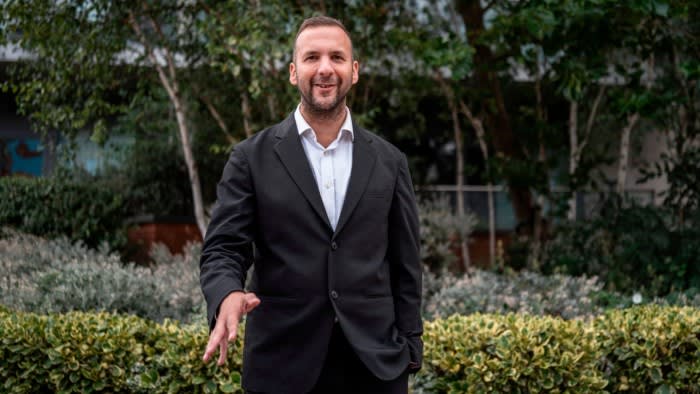Unlock the Editor’s Digest for free
Roula Khalaf, Editor of the FT, selects her favourite stories in this weekly newsletter.
The leader of the Green party has called for the Bank of England to stop paying interest on reserves held by commercial lenders and instead invest in public services, rejecting claims that his leftwing stance will repel conservative voters.
Zack Polanski told the Financial Times that ending these payments, a policy also put forward by Nigel Farage’s right-wing populist party Reform UK, could save the government up to £20bn a year.
“We don’t actually need to be paying that interest, we could be putting it straight back into our economy,” Polanski said, speaking ahead of the Green party conference in Bournemouth this weekend.
Reserves held by lenders at the central bank have swelled as a result of the bond-buying, or quantitative easing (QE), programmes following the 2008-09 global financial crisis.
Under QE schemes, the BoE creates central bank reserves to buy bonds, which are deposited at the bank in accounts held by commercial lenders. The BoE then pays interest to these lenders on these reserves.
It currently pays a rate of 4 per cent on reserves created as a result of the programme under which it bought hundreds of billions of pounds of UK government bonds.
Some economists have argued it could switch to a “tiered” system under which it pays interest on only a portion of those reserves, allowing it to continue setting short-term interest rates while saving money. This would mirror the practice of other institutions, including the European Central Bank, but it is opposed by the BoE and chancellor Rachel Reeves has said she is against changing the system.
The leader of the Greens, which have four MPs in the House of Commons, said the wider problem for the left “has been one of storytelling” as well as “scaremongering by the rightwing press about policies that will improve people’s lives”.
 Zack Polanski, centre, after being announced as the new leader of the Green Party on September 2 © James Manning/PA Wire
Zack Polanski, centre, after being announced as the new leader of the Green Party on September 2 © James Manning/PA Wire
Polanski secured a landslide victory in the Greens’ leadership race in September on a platform of “ecopopulism” and a promise to take on the rhetoric of Reform, which has vowed to scrap net zero targets if it wins the next election.
He has since pushed the party on to more left-wing ground as he seeks to attract disenchanted Labour voters.
The 42-year-old self-described “Duracell bunny” said he was inspired by New York City’s mayoral candidate Zohran Mamdani, who has built a huge following on social media arguing for socialist policies.
But the big test for Polanski will be whether he can expand the party’s pool of backers on the left while maintaining support from moderate environmentalists in rural seats.
The latter group has made up a key part of the Greens’ coalition in recent years, helping them win in former Tory-leaning seats such as Waveney Valley in East Anglia and North Herefordshire.
Recommended
However, Polanski said he “totally refutes” the view that the Greens would lose the support of “small-c” conservative voters.
“I want to tax wealth to reduce inequality. I want to make sure that we’re defending the National Health Service. I want to make the case for universal free childcare. They’re actually really popular policies,” he said.
Polanski’s strategy to woo disenfranchised Labour voters has been aided by damaging internal divisions within the new left-wing project founded by former Labour leader Jeremy Corbyn and independent MP Zarah Sultana.
Last month, the fledgling party’s co-leaders clashed publicly over the launch of a new membership portal.
The Greens have picked up 12,000 new members since Polanski was elected, taking the total to 80,000 — more than the Liberal Democrats on 60,000. Reform, by contrast, has 250,000 members.
Public support for the Greens seems little changed, however. The latest polling data suggest 10 per cent of voters would back the party — roughly the same figure as around the July 2024 election. Reform is ahead on 30 per cent, with Labour on 20 per cent.
Polanski is seeking to broaden his coalition with the message that wealth is being hoarded by the ultra-rich in Britain and that public services and the economy would function better if it was redistributed.
He has argued for a 1 per cent tax on assets over £10mn and 2 per cent on assets above £1bn, and believes capital gains tax should be brought in line with income tax.
“We tax earned income more than we tax unearned wealth. I think that’s the wrong way around,” he noted.
 The Greens have picked up 12,000 new members since Polanski was elected, taking the total to 80,000 © Abdullah Bailey/Alamy
The Greens have picked up 12,000 new members since Polanski was elected, taking the total to 80,000 © Abdullah Bailey/Alamy
Polanski admitted that some individuals would leave the UK if a wealth levy was imposed, but said: “If they’re not willing to pay a bit more tax to invest in public services, I’m quite happy to see them go.”
He also dismissed Reeves’ fiscal rules as “arbitrary” and “self-imposed”, arguing the government should prioritise borrowing more to invest while conceding ministers needed to “act responsibly”.
Reeves’ fiscal rule stipulates that current spending must be matched by tax receipts by 2029-30.
Polanski said his most “surprising” view may be on the environment. He believes the poorest in society have been asked to pick up an unfair share of the bill for environmental policies, and it is turning them away from the net zero agenda.
“Governments have been getting it wrong in terms of people not feeling like they understand why the decisions are being made,” he said. “We need big businesses and polluters and governments to ultimately be footing the bill.”

